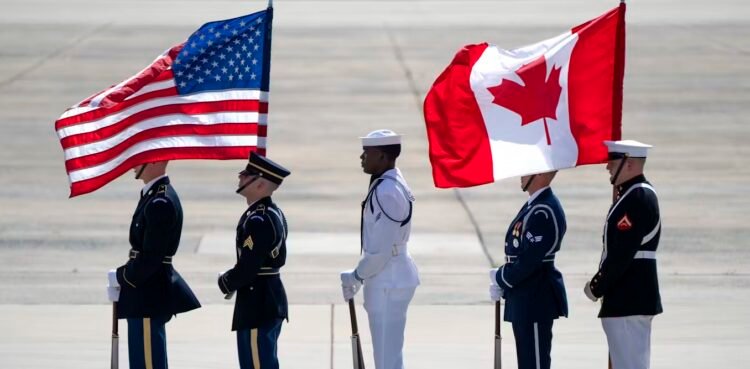HALIFAX — If former U.S. President Donald Trump fails to bring Canada under American influence through economic pressure, could he resort to military force?
While many experts dismiss the idea as absurd, political science professor Aisha Ahmad isn’t so quick to rule it out.
“Given the sheer imbalance of power between the United States and Canada, an invasion would lead to an almost immediate defeat of the Canadian Armed Forces,” said Ahmad, a professor at the University of Toronto. She recently explored this scenario in an essay for The Conversation.
“But a military victory wouldn’t be the end of the story—it would only be the beginning.”
Trump first floated the idea of turning Canada into America’s 51st state in December. Then, on January 7, he suggested the U.S. might use military force to seize Greenland and the Panama Canal. When asked whether he would also consider military action against Canada, he dismissed the notion, saying he would use “economic force” instead. Nevertheless, his comments left many Canadians uneasy, wondering just how far he might go.
Ahmad, an expert on insurgencies who has advised U.S. military officials at the Pentagon, believes that if the U.S. ever did invade Canada, it would face a long and grueling resistance movement.
“It’s impossible to annex Canada without sparking conflict,” she explained. “People don’t become insurgents overnight—it happens when they lose family members, when hospitals are inaccessible, when their way of life is threatened. When survival is at stake, people fight back.”
At first, resistance would likely take the form of small-scale sabotage—disrupting infrastructure, diverting resources, and carrying out minor acts of defiance. Over time, however, resistance fighters would escalate their efforts, launching ambushes and raids, chipping away at the occupying force’s strength and morale. With widespread public support, they could easily blend into the population, making the U.S. military’s job even harder.
“The history of guerrilla warfare proves that even vastly outmatched groups can drain a stronger enemy’s resources over time,” Ahmad wrote. “Trump is delusional if he thinks 40 million Canadians would simply accept being conquered.”
To put things in perspective, if just one percent of Canada’s population actively resisted, that would mean 400,000 insurgents—ten times the number of Taliban fighters who managed to outlast the U.S. and its allies over 20 years in Afghanistan. Ahmad argues that the U.S. has a poor track record when it comes to counterinsurgency, citing failures in Iraq, Vietnam, and other conflicts.
Would a U.S. Occupation Be Violent?
Howard Coombs, director of the Queen’s Centre for International and Defence Policy in Kingston, Ontario, agrees that an American invasion would likely be swift, but he questions whether it would lead to prolonged violence.
“The U.S. military would aim to minimize destruction and civilian casualties to prevent stirring up mass resistance,” Coombs explained. He pointed out that American and Canadian forces used similar strategies during the war in Afghanistan to keep local populations from turning against them.
“Having a cooperative or neutral population is far better than fighting thousands of small battles every day,” he said.
A retired officer of the Canadian military, Coombs also doubts that Canadians could sustain a long-term insurgency.
“People like to imagine they’d fight to the bitter end, but I don’t think that would be the reality,” he said. “Where would supplies come from? Unlike past insurgencies, Canada doesn’t have a porous border to smuggle in weapons and resources. Would Russia really send aid through Alaska? Would Britain air-drop supplies across the Atlantic?”
Ahmad, however, believes that geopolitical rivals like Russia and China would have every reason to back a Canadian resistance effort.
“They would see it as an opportunity to weaken the United States,” she said. “Covert support through third parties is a well-documented strategy in modern warfare, and I’ve seen it play out in multiple conflicts.”
A Laughable Idea or a Real Concern?
Despite all this speculation, American military historian Eliot Cohen dismisses the idea of a U.S. invasion as pure fantasy.
“It’s completely ridiculous,” said Cohen, a former dean at Johns Hopkins University’s School of Advanced International Studies. “Even this administration—no matter how reckless—would never seriously consider it.”
Cohen believes Canadians shouldn’t take Trump’s rhetoric too seriously.
“My advice? Don’t let him get under your skin,” he said.
In a recent article for The Atlantic, Cohen took a lighthearted approach to the topic, reminding Americans that past attempts to invade Canada ended in disaster.
In 1775, for example, U.S. troops tried to take Quebec, distributing pamphlets—translated awkwardly into French—proclaiming, ‘You have been conquered into liberty.’ The campaign ended with an embarrassing American defeat.
During the War of 1812, former U.S. President Thomas Jefferson dismissed the idea of conquering Canada as “a mere matter of marching.”
“He couldn’t have been more wrong,” Cohen wrote. “The U.S. launched at least eight invasions of Canada during the war—losing almost all of them. Every time, they got beaten back.”
Beyond the historical failures, Cohen also pointed out that the U.S. would have little to gain from annexing its northern neighbor.
“Canada is massive. It has 40 million people who overwhelmingly do not want to become Americans,” he said. “An invasion would be a logistical nightmare, universally condemned, and totally unnecessary. And honestly—who in the U.S. wants 40 million progressives suddenly added to their voter base? It just doesn’t make sense.”

 English
English



























































